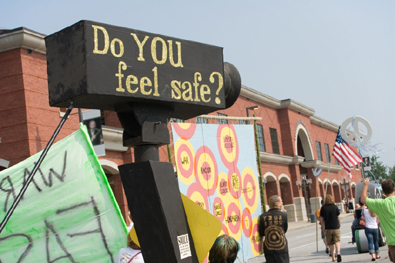Facebook 'activism': how about a greater good?

Is student "engagement" always a good thing?
In the old (very old) days, student activism meant something, stood for something and required some effort and personal risk taking. In the 1960’s, students took to the streets and literally put their lives on the line in the hopes of spurring a more humane society.
In today’s Facebook and MySpace worlds, however, student “activism” is self-centered and effortless. In “Homework for Facebook students: hack your own social network” I cite a Facebook “activist” on why he believes changes to Facebook services provisioning harm “Civil & Human Rights”:
We all know who has dumped who, who is doing what, and who doesn't like something anymore. This is invasive, and while it is displayed for others to see, it is not meant to bombard their homepage.
In the 1960’s, students marched in the face of police armed force to stop the bombing of people; in 2006, students click a computer mouse to stop text “bombardments” of personal vanity homepages.
What is the mighty Facebook “uprising”? It is an online gossip fest about the right to gossip online, for free.

In “Notes from the tech conference underground,” fellow ZDNet blogger Dan Farber ponders how personal empowerment enabled by empowering technology may, or may not, be applied towards a greater good. He juxtaposes today’s technology avant guarde to the revolutionary avant guarde of the 1960’s:
At these conferences you get the feeling you are part of an underground movement, revolutionaries plotting to overthrow the establishment, or at least reshape the balance of power. The average age of participants skew younger than other conferences. The overarching theme is user production, users in charge, taking back the Net (or at least keeping it open and unfettered), mashing up, tapping into the feed universe, social media, multimedia, virtual worlds, owning your Web data, DIY and a "we are gaining momentum and having more impact" on everything from politics to popular culture attitude.
It reminds me of the 1960s, when idealism, mind drugs, new music, civil rights, and the anti-Vietnam war sentiment fueled a cultural revolution. In today's context, the Web is the mind drug, iTunes (despite its DRM) is emblematic of the new music, Iraq the unpopular war, cyberspace a new civil rights battleground and idealism is once again fueled by a movement, this time led by millions of bloggers, podcasters and vloggers reaching hundreds, thousands and millions of people.
The 1960s melted away, one war ended, another started, drug abuse exploded, civil rights struggles continued, and the vast majority of young, idealistic 'revolutionaries' impacted by the movement drifted into the mainstream, with mortgages, jobs and families. Forty years from now, the idealism and liberating aspect of the Net germinating now will hopefully have altered the patterns of repetition that seem to mark the existence of our species on this planet, but don't count on it…
We certainly can’t count on Facebookers to lead the way!
Moreover, if “user production, users in charge, taking back the Net” nets an even more self-centered populace, is “users in charge” a good thing?
ALSO SEE: Web 2.0 'users in control': Of who, and to what means?